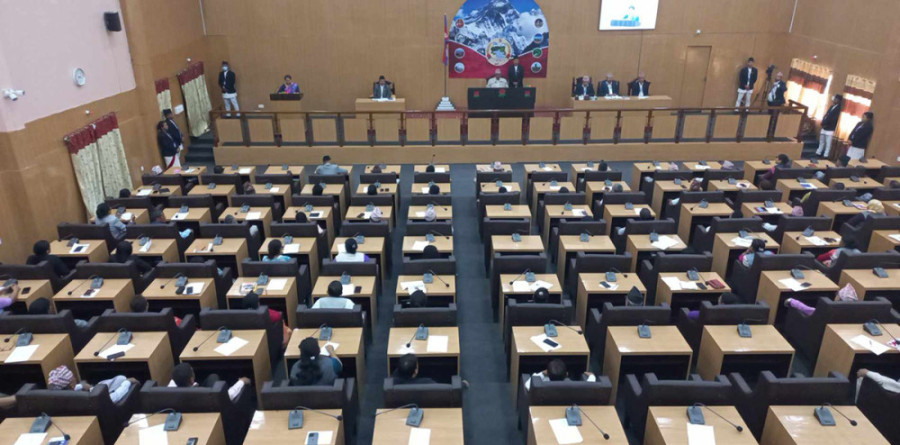Editorial
Hitting a new low
The government formation process in Koshi province showed the ugliest side of national politics.
Yet another ugly political show unfolded in Koshi Province on Monday, as both the ruling and opposition parties competed to undermine the parliamentary process. Following a vote in the provincial assembly on the day, a new government is in place but there are serious doubts over its longevity. At first, the ruling alliance made a mockery of the Speaker’s position by forcing the then Speaker Baburam Gautam, elected from CPN (Maoist Centre), to sign in favour of the Nepali Congress chief ministerial candidate Uddhav Thapa. The Congress-led coalition produced the signature of majority members, including that of Gautam, of the assembly before the province head to get Thapa appointed chief minister. The inclusion of the Speaker’s signature was challenged in court.
The Supreme Court in its verdict last month termed Gautam’s inclusion in the government formation process unconstitutional and ordered the authorities to elect a new chief minister. But the coalition later asked Gautam to resign from the post and awarded him with a ministerial position in order to get him to vote, unconstitutionally, in favour of the ruling coalition so that it could form the government. The Congress-led coalition didn’t stop there. Chief Minister Thapa, who got a vote of confidence from the assembly on Monday to retain his position, as well as the ruling parties, have been resorting to every trick in the book to secure the majority. The coalition is still walking a tightrope though, as the ruling parties have just 47 members in the 93-member assembly.
The main opposition party also stooped low. As the Speaker resigned from the post to become minister in the provincial Cabinet, deputy Speaker Srijana Danuwar of CPN-UML was to chair the assembly sitting on Monday. But she escaped it by flying to Kathmandu “for treatment” in the morning even as the meeting to conduct a vote of confidence—a meeting she had called—was scheduled for the afternoon. In the event, Thapa was appointed chief minister with the help of a vote from Israil Mansuri, who was chairing the assembly on the day, again raising questions over the authenticity of his vote. If challenged in court, this may invite yet another round of instability and political crisis in Koshi.
All this happened in Koshi as the political parties failed to show even minimum decency in the course of government formation. While the general public is fed up with unhealthy political bargaining at the centre, politicians in the provinces are not only replicating the same but also resorting to even uglier games. Arguably, no chief minister, ministers or lawmakers has done anything worthwhile for other provincial officials to follow suit. This has bigger consequences. It substantiates the claims of those who believe the provinces are unnecessary and need to be scrapped. Even many of those who were formerly in favour of strong provinces are now starting to question their relevance. This is unfortunate. As we have repeatedly pointed out in this space before, without the provinces, the whole edifice of federalism, brought with much blood and sweat of Nepali people, will come tumbling down. If our major political parties don’t mend their errant ways, people may not hesitate to boot them out along with the system they helped bring about—much to the detriment of this country rich in all kinds of diversity.




 13.12°C Kathmandu
13.12°C Kathmandu














